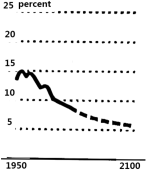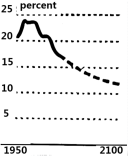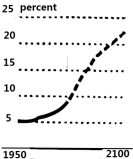In China, there are more and more people leaving the countryside to hunt for jobs in the cities, because the countryside is much poorer than the city, and often there isn’t much work there. Services such as hospital and transport are usually much better in the city than in the countryside. They hope that their lives will improve when they move to the city.
But in the big cities of Europe like London or Paris, people are moving out of the city. These rich families want to live a quieter life. They are tired of the noise and the dirt of the city, and they are tired of the crowded streets, crowded trains and buses. They don’t want to live in the cities any more. They want a house with a garden in the countryside, and breathe the fresh air there. So they move out of the cities. Some don’t go very far, just a little way out of the city, to the towns near the cities. Other people move to the real countryside with sheep, cows and green fields. There they start new lives and try to make new friends.
Not all those who move from the city to the countryside are happy. After two or three years, many people who have done this feel that it is a big mistake. They don’t make so much money and there isn’t much work to do. People in the countryside are different and aren’t always very friendly. As a result, quite a lot of people who have moved to the countryside move back to the city. “It’s wonderful to see crowds in the streets and cinema lights.” they say.
【小题1】Which is NOT the reason for people moving to the cities in China?| A.The countryside is much poorer than the city. |
| B.People in the countryside have nothing to eat. |
| C.People in the countryside don’t have much work to do there. |
| D.Services in cities are usually much better than those in the countryside. |
| A.Because they will find good jobs. |
| B.Because they like feeding sheep and cows in the green fields. |
| C.Because they can make more money there. |
| D.Because they are tired of living in the city. |
| A.Moving Out or Moving back |
| B.Living in the City |
| C.Living in the Countryside |
| D.Living a Happy Life |
For almost all of human history, the Earth's population has tended to be younger. But since the last World Population Day on July 11, a major shift occurred: There are now more people aged 65 and older than there are under age five.
World Population Day was established by the United Nations Development Program in 1989 to bring attention to population issues. Having more people on the planet is not the only concern, though, since a population's age structure matters too.
Increased lifetime is a remarkable human success story, but having more elderly people also creates a number of socioeconomic concerns. The global population will continue to age as these two groups grow in opposite directions. By 2100, the percentage of the population aged 65 and older will rise to nearly 25 percent — about five times that of children under five.
“Most developed countries have been aging for a century, giving them time to prepare for the changes. But developing countries will become old before they become rich,” says researcher Toshiko Kaneda. Many countries in Latin America and Asia are aging much faster and have less time and resources to prepare health-care systems.
What are the consequences of an older global population? Supporting elderly people is more expensive than caring for young ones. Pressing issues arise like how to provide long-term care, and maintain a labor force. In developed regions like Europe, where 10 percent of the population over age 50 is childless, elderly care is a major worry.
“Not a single country has been able to change declining trends in fertility (生育) despite government requests for people to reproduce as has been done across Europe and in Japan,” Kaneda says. “The aging trend is continuous. ”
But declining fertility rates can have positive effects too, says Kaneda. When fertility rates decline but the population hasn't aged yet, governments can spend more on secondary and higher education, and benefit the economy. Both Thailand and South Korea have seized the opportunity during this ideal period.
【小题1】What do we know about the global population?| A.It tended to be younger until now. |
| B.People are living longer and having fewer kids. |
| C.Age structure matters more than population size. |
| D.Developed countries are facing tougher challenges. |
A. | B. |
C. | D. |
| A.Critical. | B.Objective. | C.Optimistic. | D.Doubtful. |
| A.The declining trend in the fertility rates. |
| B.The consequences of the aging population. |
| C.The establishment of World Population Day. |
| D.The present situation of the global population. |
In China, there are more and more people leaving the countryside to hunt for jobs in the cities, because the countryside is much poorer than the city, and often there isn’t much work there. Services such as hospital and transport are usually much better in the city than in the countryside. They hope that their lives will improve when they move to the city.
But in the big cities of Europe like London or Paris, people are moving out of the city. These rich families want to live a quieter life. They are tired of the noise and the dirt of the city, and they are tired of the crowded streets, crowded trains and buses. They don’t want to live in the cities any more. They want a house with a garden in the countryside, and breathe the fresh air there. So they move out of the cities. Some don’t go very far, just a little way out of the city, to the towns near the cities. Other people move to the real countryside with sheep, cows and green fields. There they start new lives and try to make new friends.
Not all those who move from the city to the countryside are happy. After two or three years, many people who have done this feel that it is a big mistake. They don’t make so much money and there isn’t much work to do. People in the countryside are different and aren’t always very friendly. As a result, quite a lot of people who have moved to the countryside move back to the city. “It’s wonderful to see crowds in the streets and cinema lights.” they say.
【小题1】Which is NOT the reason for people moving to the cities in China?| A.The countryside is much poorer than the city. |
| B.People in the countryside have nothing to eat. |
| C.People in the countryside don’t have much work to do there. |
| D.Services in cities are usually much better than those in the countryside. |
| A.Because they will find good jobs. |
| B.Because they like feeding sheep and cows in the green fields. |
| C.Because they can make more money there. |
| D.Because they are tired of living in the city. |
| A.Moving Out or Moving back |
| B.Living in the City |
| C.Living in the Countryside |
| D.Living a Happy Life |
A decreasing birthrate depends to a large extent on the availability and use of birth control and on high living levels that make the production of additional children to provide necessary and inexpensive labor unnecessary. Family planning is a national policy in many industrial countries, such as Japan and most of European countries. As a result, in most cases the birthrate has decreased. Many developing countries have followed the lead of India (which has since 1952 conducted an extensive, but not totally successful,birth control program) in trying to promote family planning as a national policy. These countries include China, Kenya, Pakistan, Turkey, Egypt, and Chile.
In the United States, facts of the population question, such as birth control and abortion,_are among the most bitterly debated subjects. The United States has disagreed strongly at times with the use of foreign aid appropriations (拨款) for family planning overseas and doing that is thought against human rights; family planning in the country is mainly run by private groups such as Planned Parenthood.
A number of nongovernmental organizations concerned with population growth have also appeared. Zero Population Growth, an educational group founded in 1970, aims to stop population growth, first in the United States and then in other countries. On the international level, besides the International Planned Parenthood Federation, the United Nations Economic and Social Council provides birth control aid to underdeveloped nations.
【小题1】All the following countries try to take family planning as a national policy EXCEPT ________.| A.Kenya | B.Pakistan |
| C.Chile | D.Russia |
| A.they take measures in family planning |
| B.they don't want to provide necessary and cheap labor |
| C.they want to live a life of high living standards |
| D.they don't want to bear more additional children |
| A.Food supplies. |
| B.An operation to end a pregnancy. |
| C.Foreign aid. |
| D.High growth of population birthrate. |
| A.Americans think there is no need to keep birth control |
| B.the government would rather not copy ways of other countries |
| C.Americans think that is against human rights |
| D.the government is rich enough to keep more children |
| A.prevent birthrate from growing |
| B.provide birth control aid |
| C.advise people to notice the population question |
| D.call on the UN to give help to undeveloped countries |
组卷网是一个信息分享及获取的平台,不能确保所有知识产权权属清晰,如您发现相关试题侵犯您的合法权益,请联系组卷网


